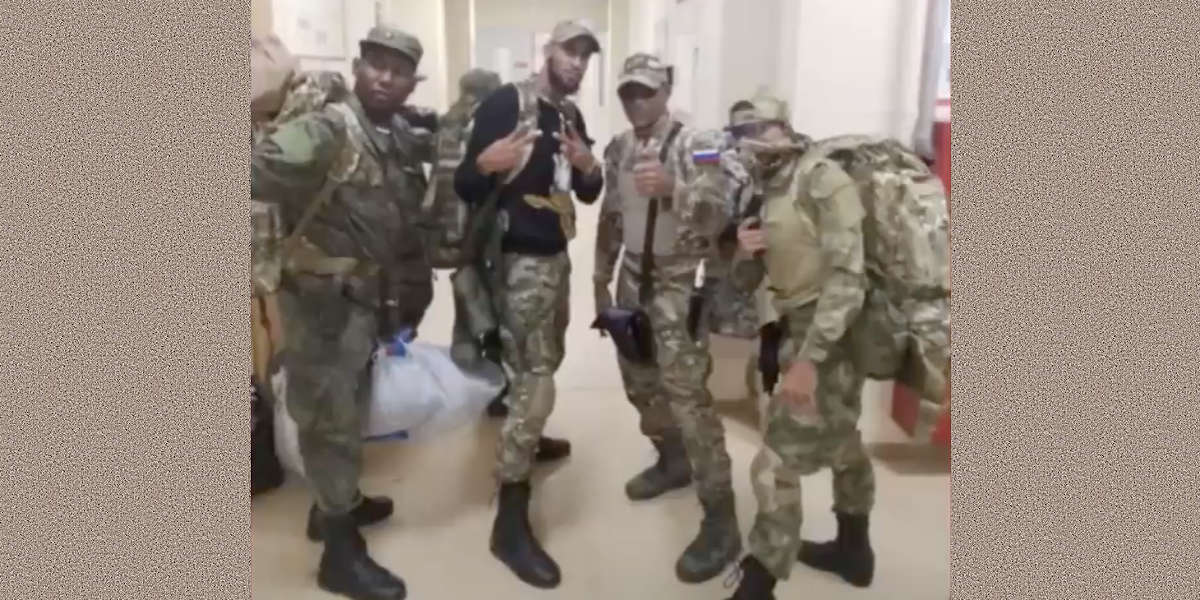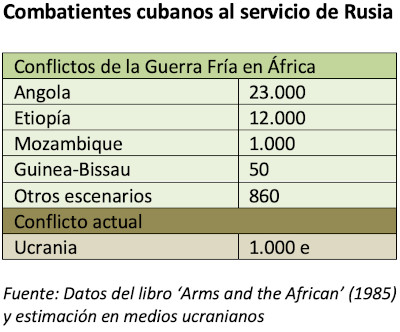In the picture
Image apparently sent by Cuban mercenaries on their way to the front [Redes].
report SRA 2024 / [PDF version]
° The Diaz-Canel government has denied having accepted a agreement with Russia to send soldiers, but the flow of volunteers confirms the involvement of the dictatorship.
° This is the foreign conflict with more Cubans since the participation of Fidel Castro's Army in the Angolan and Ethiopian wars in the 1980s.
° Initially, some of the enlisted men reported that they were unaware that they were going to be sent to the front, where they arrived unprepared and without the necessary equipment.
The Cuban dictatorship has denied being involved in sending mercenaries to join the Russian units fighting on the Ukrainian front, but its high issue indicates rather the opposite. Since the beginning of 2023, the first year of the war and the need for more soldiers, Russia has been recruiting fighters from other countries and Cuba has provided one of the largest contingents, according to the Wall Street Journal.
The first news on the presence of Cubans appeared in June 2023; two months later there was talk of more than one hundred mercenaries - based on the issue of passports retained then by some Russian military commanders to force them to go to the front and stay there -, while for their part the Ukrainian authorities have considerably raised that figure in declarations to the WSJ. The Kiev representative for Latin America and the Caribbean, Ruslan Spirin, has spoken of 400 Cubans detected in the fighting, while the deputy Maryan Zablotskyi puts the issue figure between 1,500 and 3,000. This presence became notorious after the increase of flights from Russia to Cuba in July and August of 2023, issue . The enlistment has been essentially motivated by the promise of monthly salaries above $2,000 when the island is going through a serious economic crisis.
Once the status was unveiled, Cubans who later traveled to Russia may have been aware that in many cases their destination would be the front line. However, many were initially deceived with offers that camouflaged the truth. This was the case with many of those who first took the route. Initial investigations spoke of 189 Cuban citizens who had been enlisted by Russian Major Anton Valentinovich Perevozchikov and Colonel Milián Gómez, military attaché of the Cuban embassy in Moscow. Their passports, withheld by the Russian authorities and revealed by the hackers ' group 'Cybernetic Resistance', revealed their identities and allowed the public denunciation of this collusion between the Castro regime and Putin's regime.
Some of these Cubans were able to contact their families or sent messages through social networks explaining how they had been recruited. Lured by job offers that did not include direct combat, but rather vague rear-guard support work, such as "participating in reconstructive forces", they were surprised when, after arriving in Russia, they were sent to military units and taken to the front line, without proper equipment and military training.
Many of them unemployed or farm laborers with very low wages, signed contracts promising a first lump sum of 195,000 rubles and then monthly payments of 204,000 rubles (about 2,000 dollars from entrance and another 2,000 rubles each month). This is a salary more than a hundred times higher than the average monthly salary in Cuba, which is 4,219 Cuban pesos (about $17 on the informal market).
Long enlistment also provides life insurance, accommodation for service or compensation, free rehabilitation in Russian military medical facilities and the right to a preferential pension after 20 years of service. Another incentive is free programs of study for the combatant's children in Russian universities. In any case, these are benefits for those who continue their lives in Russia, having already been naturalized. Basically, these benefits are more oriented to attract Russian citizens or citizens of former Soviet republics who wish to settle legally in Russia. The Kremlin consolidated this path with a decree in January 2024 offering citizenship to those who sign a contract with the Army to enlist, with the possibility for both parents and children of the enlisted person to access a Russian passport.
Among the disillusioned Cubans is Enrique González. According to what he told Reuters, he and his companions left the island without being completely sure that it was indeed an official program; upon their arrival they were handed a paper with the contract translated into Spanish, which specified that their task was to participate in the work of the Russian forces. "Everyone who came here knew what they were coming for," he said; in any case, the lack of prior detailed information may have given some people the idea that they were going to work away from the front.


